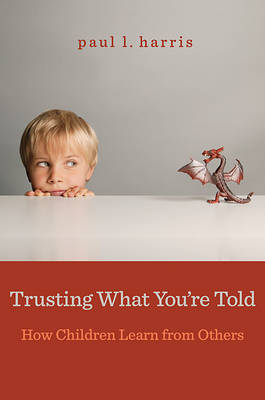
Trusting What You're Told
How Children Learn from Others
Seiten
2012
The Belknap Press (Verlag)
978-0-674-06572-7 (ISBN)
The Belknap Press (Verlag)
978-0-674-06572-7 (ISBN)
- Titel ist leider vergriffen;
keine Neuauflage - Artikel merken
If children were little scientists who learn best through firsthand observations and mini-experiments, how would a child discover that the earth is round--never mind conceive of heaven as a place someone might go after death? Trusting What You're Told begins by reminding us of a basic truth: Most of what we know we learned from others.
If children were little scientists who learn best through firsthand observations and mini-experiments, as conventional wisdom holds, how would a child discover that the earth is round - never mind conceive of heaven as a place someone might go after death? Overturning both cognitive and commonplace theories about how children learn, "Trusting What You're Told" begins by reminding us of a basic truth: Most of what we know we learned from others. Children recognize early on that other people are an excellent source of information. And so they ask questions. But youngsters are also remarkably discriminating as they weigh the responses they elicit. And how much they trust what they are told has a lot to do with their assessment of its source. "Trusting What You're Told" opens a window into the moral reasoning of elementary school vegetarians, the preschooler's ability to distinguish historical narrative from fiction, and the six-year-old's nuanced stance toward magic: skeptical, while still open to miracles.
Paul Harris shares striking cross-cultural findings, too, such as that children in religious communities in rural Central America resemble Bostonian children in being more confident about the existence of germs and oxygen than they are about souls and God. We are biologically designed to learn from one another, Harris demonstrates, and this greediness for explanation marks a key difference between human beings and our primate cousins. Even Kanzi, a genius among bonobos, never uses his keyboard to ask for information: he only asks for treats.
If children were little scientists who learn best through firsthand observations and mini-experiments, as conventional wisdom holds, how would a child discover that the earth is round - never mind conceive of heaven as a place someone might go after death? Overturning both cognitive and commonplace theories about how children learn, "Trusting What You're Told" begins by reminding us of a basic truth: Most of what we know we learned from others. Children recognize early on that other people are an excellent source of information. And so they ask questions. But youngsters are also remarkably discriminating as they weigh the responses they elicit. And how much they trust what they are told has a lot to do with their assessment of its source. "Trusting What You're Told" opens a window into the moral reasoning of elementary school vegetarians, the preschooler's ability to distinguish historical narrative from fiction, and the six-year-old's nuanced stance toward magic: skeptical, while still open to miracles.
Paul Harris shares striking cross-cultural findings, too, such as that children in religious communities in rural Central America resemble Bostonian children in being more confident about the existence of germs and oxygen than they are about souls and God. We are biologically designed to learn from one another, Harris demonstrates, and this greediness for explanation marks a key difference between human beings and our primate cousins. Even Kanzi, a genius among bonobos, never uses his keyboard to ask for information: he only asks for treats.
Paul L. Harris is Victor S. Thomas Professor of Education at Harvard University.
| Erscheint lt. Verlag | 25.5.2012 |
|---|---|
| Zusatzinfo | 3 halftones, 3 line illustrations, 19 graphs |
| Verlagsort | Cambridge, Mass. |
| Sprache | englisch |
| Maße | 140 x 210 mm |
| Gewicht | 666 g |
| Themenwelt | Sonstiges ► Geschenkbücher |
| Geisteswissenschaften ► Psychologie ► Entwicklungspsychologie | |
| Geisteswissenschaften ► Psychologie ► Pädagogische Psychologie | |
| Geisteswissenschaften ► Psychologie ► Verhaltenstherapie | |
| Sozialwissenschaften ► Pädagogik ► Allgemeines / Lexika | |
| Sozialwissenschaften ► Pädagogik ► Schulpädagogik / Grundschule | |
| ISBN-10 | 0-674-06572-7 / 0674065727 |
| ISBN-13 | 978-0-674-06572-7 / 9780674065727 |
| Zustand | Neuware |
| Haben Sie eine Frage zum Produkt? |
Mehr entdecken
aus dem Bereich
aus dem Bereich
Vormals Oerter & Montada
Buch | Hardcover (2018)
Julius Beltz GmbH & Co. KG (Verlag)
64,00 €
Grundlagen, Diagnostik und Therapie vom Säuglingsalter bis zum alten …
Buch | Hardcover (2022)
Klett-Cotta (Verlag)
45,00 €
Deutsche Auflage unter Mitarbeit von Sabina Pauen
Buch | Hardcover (2022)
Springer (Verlag)
59,98 €


